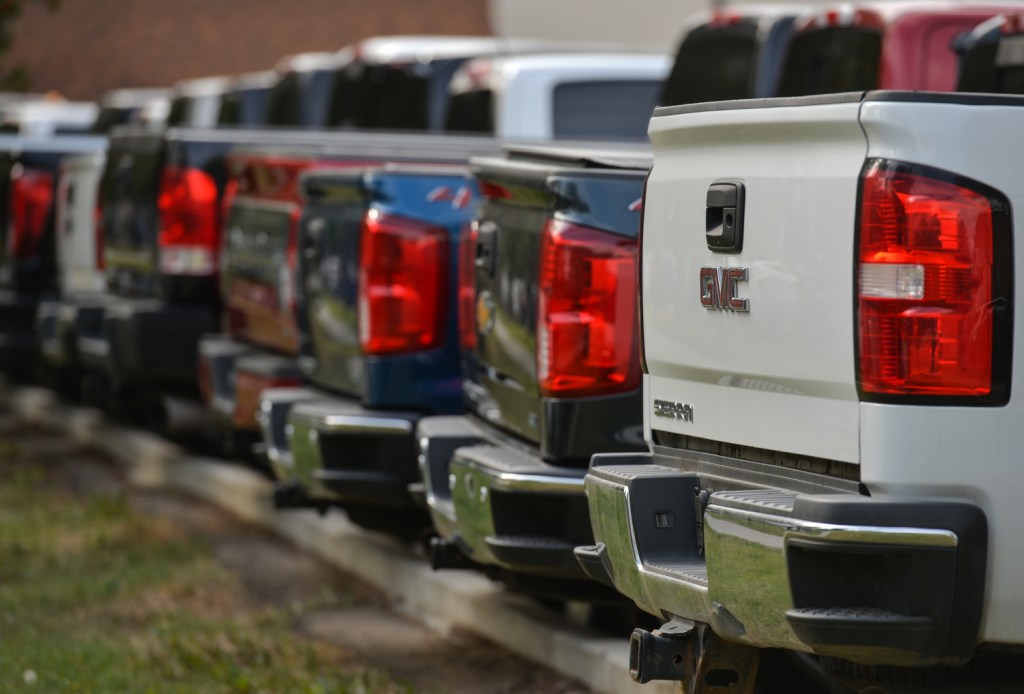
Blame the Chicken Tax for High Pickup Truck Prices
If you have looked at the prices of new cars lately, the price of pickup trucks has not been exempt from the chaos. There is a bit of history involved with the high price of trucks, more specifically, light-duty trucks. You can partly blame the high prices on the chicken tax from the 1960s.
The pickup truck chicken tax goes back to World War II

According to The Dallas Morning News, the high prices for pickup trucks aren’t just in your mind. While the price of all new and used cars is high right now, pickup trucks seem to be at the top of the “expensive” list. Semiconductor chip issues have left automakers scrambling to keep up with demand, but it goes further than that. Imported pickup trucks are subject to a 25% tariff. This keeps the demand high and restricts competition in the market.
During the presidency of Lyndon B. Johnson, the U.S. imposed a 25% tariff on light-duty trucks, potato starch, dextrin, and brandy. Chicken farming became a huge thing, and chicken became known as a luxury item. European countries placed a 25% tariff on U.S. chicken, and Johnson responded with a tax of his own on imported “luxury” items. The drama surrounding this period from 1961 to 1964 is known as the “chicken war.” Therefore, this is known as the “chicken tax.”
These days, pickup trucks aren’t necessarily a luxury item. Trucks are used for families, work, and towing trailers and RVs. These are just everyday chores for everyday people.
Prices on pickup trucks are up over 40% compared to last year
The U.S. Bureau of Labor Statistics says that new car and truck prices are up 12% this year over 2020. Prices for used cars, trucks, and SUVs are up 40% over this time last year. Fewer new options are coming out because automakers can’t keep up with demand. That means used cars and pickup trucks are in high demand, so the prices continue to climb.
This comes back to the chicken tax. Initially, the government wanted to keep companies like Volkswagen from selling trucks in the U.S., which would take away from American trucks. While this is no longer an issue and Volkswagen isn’t making any light-duty trucks for this market, the chicken tax remains in place.
That is why U.S. brands dominate the truck market. Ford F-Series trucks, the GM Chevrolet Silverado/Sierra, and the Dodge Ram trucks make up for 95% of light-duty pickup truck sales in the U.S. Toyota makes the Tundra in Texas now, which also accounts for a small part of the market. Beyond that, virtually no brand imports trucks into to America because of the chicken tax. Ford and GM made over $10 billion in 2021, with light-duty trucks being the best sellers.
This tariff on light-duty trucks isn’t going anywhere
For now, it doesn’t look like the chicken tax is going anywhere. The Dallas Morning News says that a free trade agreement with South Korea from 2011 was set to expire last year, but the government squashed that. The government pushed off the tariff elimination until 2041. An estimated 14,000 to 32,000 more light-duty trucks would have been available had those expired.
Another U.S.-Mexico-Canada Agreement requires that trucks be made of 45% North American parts by North American workers paid more than $16 an hour. That means it is more expensive to make trucks in Mexico to import into the U.S.
While it makes sense to make pickup trucks in the country and sell in the same place, it would be nice to see some competition. Without a tariff in place, more competition in the pickup truck market might mean more competitive (and lower) pricing.



